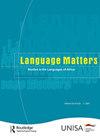Borrowed Discourse-Pragmatic Features in Kenyan English
IF 0.8
3区 文学
0 LANGUAGE & LINGUISTICS
引用次数: 2
Abstract
Abstract This article explores five discourse-pragmatic features—si, sijui, eish, kumbe, and kweli—which are borrowed from African languages into Kenyan English, in order to examine their sources, meanings, frequencies, spelling adaptation, collocational patterns, positioning, syntactic distribution, and discourse-pragmatic functions. The data, which are extracted from the Kenyan components of the International Corpus of English-East Africa and the Global Web-based English corpus, are analysed quantitatively and qualitatively, from a postcolonial corpus pragmatic framework. The results show that the borrowed discourse-pragmatic features are infrequent, orthographically stable, favour clause-initial position, and rarely co-occur with other discourse-pragmatic features. Si, sijui, and kweli are pragmatic markers used to request confirmation of shared knowledge, indicate uncertainty, and emphasise the truth value in a proposition, respectively. Eish and kumbe are interjections which are mainly used to express emotions of irritation and surprise, respectively. This study extends the research on the discourse-pragmatic features of Kenyan English.肯尼亚英语中的借用语篇语用特征
摘要本文探讨了肯尼亚英语从非洲语言中借用的五种语篇语用特征si、sijui、eish、kumbe和kweli,以考察它们的来源、含义、频率、拼写适应、搭配模式、定位、句法分布和语篇语用功能。这些数据是从东非国际英语语料库和基于全球网络的英语语料库的肯尼亚部分提取的,从后殖民语料库语用框架中进行了定量和定性分析。结果表明,借用语篇的语用特征不常见,拼写稳定,偏向从句起始位置,很少与其他语篇语用特征同时出现。Si、sijui和kweli是语用标记,分别用于请求确认共享知识、表示不确定性和强调命题中的真理价值。Eish和kumbe分别是主要用来表达愤怒和惊讶情绪的感叹词。本研究扩展了对肯尼亚英语语篇语用特征的研究。
本文章由计算机程序翻译,如有差异,请以英文原文为准。
求助全文
约1分钟内获得全文
求助全文
来源期刊

Language Matters
Multiple-
CiteScore
1.20
自引率
0.00%
发文量
19
期刊介绍:
The purpose of Language Matters is to provide a journal of international standing with a unique African flavour focusing on multilingualism in Africa. Although the journal contributes to the language debate on all African languages, sub-Saharan Africa and issues related to multilingualism in the southern African context are the journal’s specific domains. The journal seeks to promote the dissemination of ideas, points of view, teaching strategies and research on different aspects of African languages, providing a forum for discussion on the whole spectrum of language usage and debate in Africa. The journal endorses a multidisciplinary approach to the study of language and welcomes contributions not only from sociolinguists, psycholinguists and the like, but also from educationalists, language practitioners, computer analysts, engineers or scholars with a genuine interest in and contribution to the study of language. All contributions are critically reviewed by at least two referees. Although the general focus remains on multilingualism and related issues, one of the three issues of Language Matters published each year is a special thematic edition on Language Politics in Africa. These special issues embrace a wide spectrum of language matters of current relevance in Southern Africa.
 求助内容:
求助内容: 应助结果提醒方式:
应助结果提醒方式:


